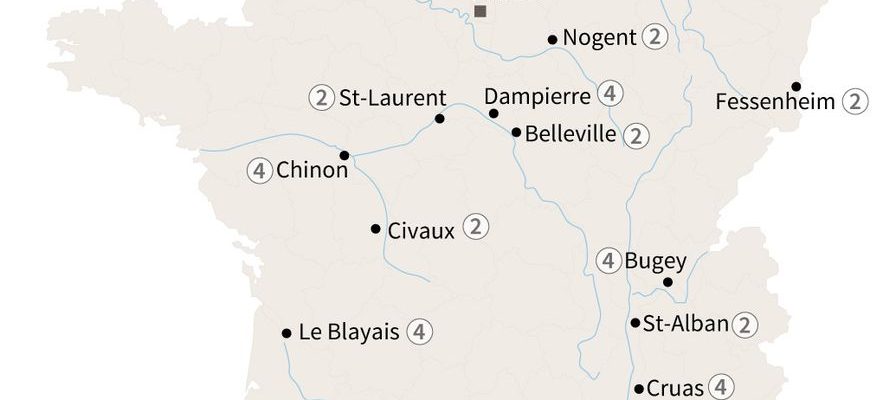This is one of the consequences of high temperatures. Due to the risk of a heat wave from this weekend – 19 departments are already on orange alert, more than half on yellow alert, according to Météo-France -, EDF foresees the risk of a production slowdown on certain nuclear sites.
Two power plants are at this time concerned: that of Bugey, in Ain, and Golfech, in Tarn-et-Garonne. “Due to high temperature forecasts on the Rhône, production restrictions are likely to affect the Bugey nuclear production site on August 20, 2023.”, can we read on the EDF website. The same goes for that of Golfech, “from August 21”.
However, this list is neither exhaustive nor definitive. For example, the Tricastin power plant (Drôme), first mentioned by EDF, is for the moment no longer concerned by this risk of production restriction. But the situation could still change in the coming days. Already last year, in addition to these three sensitive sites, several other plants had seen their production slowed down, such as that of Saint-Alban (Isère) or Blayais (Gironde).
Risk of warming of rivers
The heat wave does not directly affect the production of nuclear sites, but poses a problem in their operation. With a major difficulty: the question of water. Indeed, a nuclear power plant needs it in large quantities, in order to cool the reactors. Hence the need to install them near rivers and rivers, or near the sea. Once this water is used, it is then discharged into nature, at a much higher temperature than when it was taken.
Location of nuclear power plants in France, with the number of reactors per plant
© / AFP
It is precisely this point that poses a problem during a heat wave. EDF is indeed subject to strict temperature thresholds in the discharge of water into nature. These are specific to each plant, and are set by the Nuclear Safety Authority (ASN). Above a certain temperature in the rivers, for example 28°C in the Rhône at the level of the Saint-Alban power station, or 28°C also for the Garonne at the Golfech power station, it is considered that there is too great a risk of damage to marine fauna and flora, and the nuclear site must then limit the power of the reactors, or even shut them down.
However, since heat waves lead to warming of the water, these temperature thresholds are reached much more quickly. The consequence for nuclear power plants is a lower level of water abstraction than normal, and therefore reduced electricity production. At the Bugey site, the high temperatures had already led to the shutdown of one of the plant’s four reactors in mid-July, for cumulative reasons of “environmental constraints and low demand for electricity”, specifies a carrier. speak to AFP.
Waiver requests
For the time being, EDF is rather trying to minimize the magnitude of these climate issues. According to the group, since 2000, production losses due to high temperature and low river flow have represented an average of 0.3% of the annual production of the nuclear fleet.
But faced with the very high temperatures in the summer of 2022, EDF had nevertheless benefited from derogations in order to be able to discharge hotter water than authorized and continue to produce electricity beyond the authorized thresholds. A total of 24 days of derogation were granted by ASN: nine days for the Tricastin plant (Drôme), eight days for the Bugey plant (Ain), six days for Golfech (Tarn-et-Garonne) and one day for Saint-Alban (Isère).
Problems that should increase with global warming. A Court of Auditors report published last March had pointed out that, according to the first analyses, there could be “a multiplication by three or four of the unavailability linked to global warming by 2050”. In certain situations, the temperature of the water withdrawn by a nuclear site could already be higher than the maximum threshold authorized for its discharge. This makes it impossible to produce electricity in compliance with the standards imposed.
Faced with this, EDF begins to get agitated. According to the website news-environmentthe French energy giant should thus request a “relaxation” of these water discharge temperature rules from the Nuclear Safety Authority, faced with the difficulty of respecting them.
